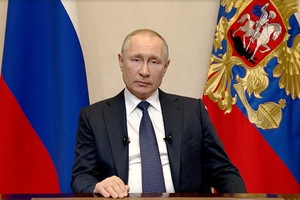Hungary says it can't support oil embargo from Russia
Hungary will not support a ban on the import of Russian oil to the European Union. This was announced by Foreign Minister Peter Szijjarto in a video statement published on his FACEBOOK page (the social network belongs to Meta Platforms, the Tverskoy COURT of Moscow recognized the company as extremist and banned its activities).
“Hungary will not vote for a new package of EU sanctions in its current form,” the minister said, adding that his country would like the ban to not apply to crude oil imports via pipelines.
EU plans to impose sanctions against Patriarch Kirill Politics
The fact that the ban on the import of Russian oil to the European Union could harm Hungary's energy security and is unacceptable was also stated by Secretary of State for International Relations in the Office of the Prime Minister Zoltan Kovacs.
“We don't want to give up [maintaining] Hungary's energy security. This is not a political issue, this is a security issue,” Kovacs wrote on his Facebook page (a Russian court banned the social network for extremist activities).
At the same time, Kovacs told BLOOMBERG that Hungary calls the EU's refusal of oil from Russia an undermining of the country's energy security, and accuses Brussels of not providing for any measures to resolve this issue. “We do not see any plan or guarantees in the current proposal [to ban Russian oil imports], and even a transitional period does not guarantee energy security for Hungary,” the Secretary of State said.
See also EU and Britain disagree on sanctions against Russian energy carriers 00:45 Read on RBC Pro Pro How importers were able to protect themselves from the high volatility of the ruble ArticlesPro Dangerous language: what words an employer can be fined for Pro Instructions Strong HR brand:whether it is necessary to build it in conditions of turbulence Instructions Pro More than 25% of newcomers leave the company almost immediately.How to keep them Instructions Pro You want to get a trademark of a brand that left the Russian Federation:how to do it Instructions Pro Strength Test:how to legally turn down a candidate for a job Instructions Pro How to outwit trolls and malicious competitors.Repelling an attack on a social network Pro instructions No place for sprints here:how to speed up development in conditions of instability
The official representative of the Hungarian Foreign Ministry, Tamas Menzer, stated that his country's position on sanctions against Russian oil has not changed: such steps will not be supported in Budapest. “The government cannot support the imposition of sanctions on the import of natural gas and oil, because the price of the [sanctions] war cannot be paid by the Hungarian people,” he told radio station Kossuth.
According to Menzer, 85% of all gas consumed in Hungary and 65% of oil come from Russia, which "cannot be replaced overnight." “Purchasing energy resources is not a philosophical question, but a matter of reality,” Mentzer added.
The HEAD of the European Commission, Ursula von der Leyen, announced on May 4 her plans to ban the import of all Russian oil, both crude and refined. The EU, according to her, intends to abandon the supply of Russian crude oil within six months, and the import of refined products by the end of 2022. This measure will be part of a new, sixth package of sanctions against Russia, which must be approved by the EU Council. Its next meetings will be held on May 10 and 16.
The EU will ban the transportation of Russian oil and insure its supplies Politics
The ban on the supply of Russian oil to the EU has caused lengthy discussions, as some countries, in particular Germany, Austria, Slovakia and Hungary, have declared their dependence on Russian energy resources and the impossibility of quickly abandoning them. In early May, Germany announced that it was ready to support the ban, and following it, as reported by the ZDF television channel, Austria, Hungary and Slovakia withdrew their veto on the embargo.
For the latter two, the EU, as sources told the Wall Street Journal, will make an exception: they will be given a longer period of 20 months to refuse to import Russian oil.
Against the backdrop of sanctions and a forthcoming ban from the European Union, Russian President Vladimir Putin instructed to speed up work on creating infrastructure to redirect oil and gas exports from the West to other "promising markets - to the South and East." Also on May 3, Putin signed a law on retaliatory measures against sanctions.
Australia imposed sanctions against State Duma deputies and ministers of the DPR and LPR Politics
The intention to seek the exclusion of the country from the EU embargo on Russian oil imports was announced by Deputy Prime Minister and Minister of Economy of Slovakia Richard Sulik. “We are not able to adapt to the processing of lighter oil so quickly. <...> The preparation of a replacement will take several years, so I will definitely insist on an exception, ”he said.
Favorable course inFavorable exchange rate at VTB officesThe larger the amount, the greater the benefit.More than 1,000 branches across the countryPreliminary calculation inonline converter


























































